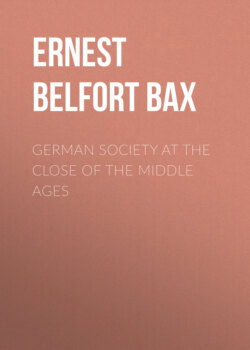German Society at the Close of the Middle Ages

Реклама. ООО «ЛитРес», ИНН: 7719571260.
Оглавление
Ernest Belfort Bax. German Society at the Close of the Middle Ages
German Society at the Close of the Middle Ages
Table of Contents
PREFACE
SOCIAL MOVEMENTS OF THE GERMAN REFORMATION
INTRODUCTION
CHAPTER I. FIRST SIGNS OF SOCIAL AND RELIGIOUS REVOLT
CHAPTER II. THE REFORMATION MOVEMENT
CHAPTER III. POPULAR LITERATURE OF THE REFORMATION
CHAPTER IV. THE FOLKLORE OF THE REFORMATION
CHAPTER V. THE GERMAN TOWN
CHAPTER VI. THE REVOLT OF THE KNIGHTHOOD
CHAPTER VII. COUNTRY AND TOWN AT THE END OF THE MIDDLE AGES
CHAPTER VIII. THE NEW JURISPRUDENCE
APPENDICES
APPENDIX A
APPENDIX B
APPENDIX C
Отрывок из книги
Ernest Belfort Bax
Published by Good Press, 2019
.....
It follows naturally from the conditions described that there was, in the first place, a conflict between the primitive inhabitants as embodied in their corporate society and the territorial lord, whoever he might be. No sooner had the township acquired a charter of freedom or certain immunities than a new antagonism showed itself between the ancient corporation of the city and the trade-guilds, these representing the later accretions. The territorial lord (if any) now sided, usually though not always, with the patrician party. But the guilds, nevertheless, succeeded in ultimately wresting many of the leading public offices from the exclusive possession of the patrician families. Meanwhile the leading men of the guilds had become hommes arrivés. They had acquired wealth, and influence which was in many cases hereditary in their family, and by the beginning of the sixteenth century they were confronted with the more or less veiled and more or less open opposition of the smaller guildsmen and of the newest comers into the city, the shiftless proletariat of serfs and free peasants, whom economic pressure was fast driving within the walls, but who, owing to the civic organisation having become crystallised, could no longer be absorbed into it. To this mass may be added a certain number of impoverished burghers, who, although nominally within the town organisation, were oppressed by the wealth of the magnates, plebeian and patrician.
The number of persons who, owing to the decay, or one might almost say the collapse, of the strength of the feudal system, were torn from the old moorings and left to drift about shiftless in a world utterly unprepared to deal with such an increase of what was practically vagabondage, was augmenting with every year. The vagrants in all Western European countries had never been so numerous as in the earlier part of the sixteenth century. A portion of these disinherited persons entered the service of kings and princes as mercenary soldiers, and thus became the first germ of the modern standing army. Another portion entered the begging profession, which now notably on the Continent became organised in orthodox and traditional form into guilds, each of which had its master and other officers. Yet another portion sought a more or less permanent domicile as journeymen craftsmen and unskilled labourers in the cities. This fact is noteworthy as the first indication of the proletariat in modern history. "It will be seen," says Friedrich Engels,[3] "that the plebeian opposition of the then towns consisted of very mixed elements. It united the degenerate components of the old feudal and guild organisation with the as yet undeveloped and new-born proletarian element of modern bourgeois society in embryo. Impoverished guildsmen there were, who through their privileges were still connected with the existing civic order on the one side, and serving-men out of place who had not as yet become proletarians on the other. Between the two were the "companions" (Gesellen) for the nonce outside the official society, and in their position resembling the proletariat as much as was possible in the then state of industry and under the existing guild-privilege. But, nevertheless, almost all of them were future guild-masters by virtue of this very guild-privilege."[4] A noteworthy feature of municipal life at this time was the difficulty and expense attendant on entry into the city organisation even for the status of a simple citizen, still more for that of a guildsman. Within a few decades this had enormously increased.
.....